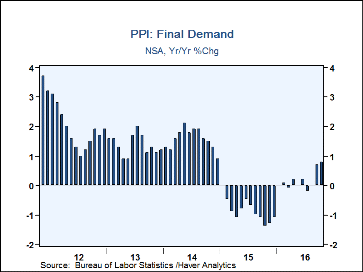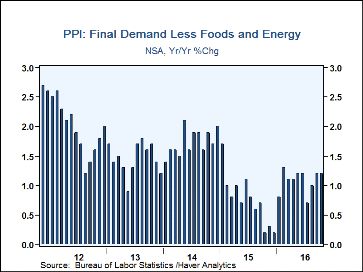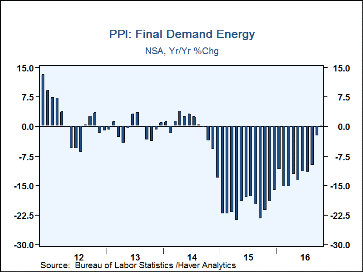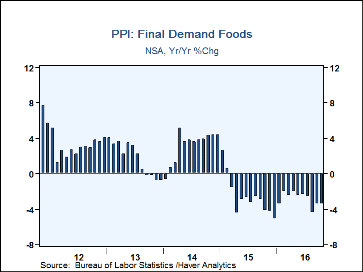 Global| Nov 16 2016
Global| Nov 16 2016U.S. Producer Prices Remain Unchanged in October with Firming Trend in Place
by:Tom Moeller
|in:Economy in Brief
Summary
The headline Final Demand Producer Price Index held steady (0.8% y/y) during October following an unrevised 0.3% September gain. A 0.3% rise had been expected for last month in the Action Economics Forecast Survey. Excluding food & [...]
The headline Final Demand Producer Price Index held steady (0.8% y/y) during October following an unrevised 0.3% September gain. A 0.3% rise had been expected for last month in the Action Economics Forecast Survey. Excluding food & energy, prices eased 0.2% (+1.2% y/y). A 0.2% increase had been expected. The PPI excluding food, energy & trade services inched 0.1% lower (+1.6% y/y), following two months of 0.3% increase. These two months of strength lifted y/y growth to 1.6%, up from 0.6% during all of last year.
Energy prices jumped 2.5% (0.3% y/y) for a second consecutive month. Gasoline prices strengthened 9.7% (0.8% y/y) to the highest level since November. Home heating oil prices declined 0.9% (-3.2% y/y) after a 9.7% jump. Natural gas costs improved 0.4% (5.9% y/y) following three months of strong increase. Residential electric power costs declined 0.9% (+0.2% y/y) to the lowest level in three months.
Food prices fell 0.8% (-3.5% y/y), the third decline in four months. Vegetable prices declined 5.0% (NSA, -7.9% y/y), and egg prices fell 21.1% (-64.1% y/y). Dairy product prices fell 2.3% (-1.8% y/y). Strengthening were fish & shellfish prices which improved 0.2% (5.2% y/y), while beef & veal costs increased 3.6% (-15.6% y/y). Grain prices increased 1.9% (NSA, -16.6% y/y), but fresh fruit & melon prices remained unchanged (NSA, +0.6% y/y).
Final demand prices for goods less food & energy increased 0.1% after a 0.3% rise. These measures raised the y/y increase to 1.3%, the strongest since November 2014. Durable consumer goods prices rose 0.3% (0.8% y/y), even though passenger car prices declined 0.5% (-0.5% y/y). Strengthening by 1.4% (2.3% y/y), however, were light truck prices. Nondurable consumer goods prices less food & energy remained unchanged, but were up by an accelerated 3.6% y/y as men's apparel prices rose 0.4% (0.3% y/y). Capital equipment prices nudged 0.1% higher (0.5% y/y) for a second month.
Final demand services prices declined 0.3%. Annual growth of 1.1% was improved from 0.9% during all of last year. Private passenger transportation costs eased 0.2% and were unchanged from last year. Trade services prices fell 0.3%, down for the fourth straight month (-0.2% y/y). Final demand services less trade, transportation & warehousing costs fell 0.3% (+2.0% y/y).
Construction prices for final demand increased 0.7%. The y/y change of 0.6% was down from the peak of 3.8% during all of 2011.
The PPI data are contained in Haver's USECON database with further detail in PPI and PPIR. The expectations figures are available in the AS1REPNA database.
Job-to-Job Transitions in an Evolving Labor Market from the Federal Reserve Bank of San Francisco can be found here.
| Producer Price Index (SA, %) | Oct | Sep | Aug | Oct Y/Y | 2015 | 2014 | 2013 |
|---|---|---|---|---|---|---|---|
| Final Demand | 0.0 | 0.3 | 0.0 | 0.8 | -0.9 | 1.6 | 1.4 |
| Excluding Food & Energy | -0.2 | 0.2 | 0.1 | 1.2 | 0.8 | 1.7 | 1.5 |
| Excluding Food, Energy & Trade Services | -0.1 | 0.3 | 0.3 | 1.6 | 0.6 | 1.2 | -- |
| Goods | 0.4 | 0.7 | -0.4 | 0.3 | -4.3 | 1.3 | 0.8 |
| Foods | -0.8 | 0.5 | -1.6 | -3.5 | -2.6 | 3.2 | 1.7 |
| Energy | 2.5 | 2.5 | -0.8 | 0.3 | -20.6 | -0.9 | -0.8 |
| Goods Excluding Food & Energy | 0.1 | 0.3 | 0.1 | 1.3 | 0.4 | 1.5 | 1.1 |
| Services | -0.3 | 0.1 | 0.1 | 1.1 | 0.9 | 1.8 | 1.6 |
| Construction | 0.7 | 0.1 | 0.0 | 0.6 | 1.9 | 2.9 | 1.8 |
| Intermediate Demand - Processed Goods | 0.3 | 0.5 | -0.1 | -0.5 | -6.9 | 0.6 | 0.0 |
Tom Moeller
AuthorMore in Author Profile »Prior to joining Haver Analytics in 2000, Mr. Moeller worked as the Economist at Chancellor Capital Management from 1985 to 1999. There, he developed comprehensive economic forecasts and interpreted economic data for equity and fixed income portfolio managers. Also at Chancellor, Mr. Moeller worked as an equity analyst and was responsible for researching and rating companies in the economically sensitive automobile and housing industries for investment in Chancellor’s equity portfolio. Prior to joining Chancellor, Mr. Moeller was an Economist at Citibank from 1979 to 1984. He also analyzed pricing behavior in the metals industry for the Council on Wage and Price Stability in Washington, D.C. In 1999, Mr. Moeller received the award for most accurate forecast from the Forecasters' Club of New York. From 1990 to 1992 he was President of the New York Association for Business Economists. Mr. Moeller earned an M.B.A. in Finance from Fordham University, where he graduated in 1987. He holds a Bachelor of Arts in Economics from George Washington University.










